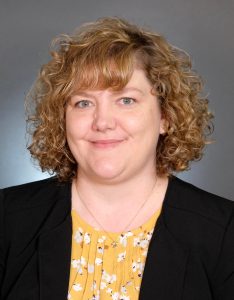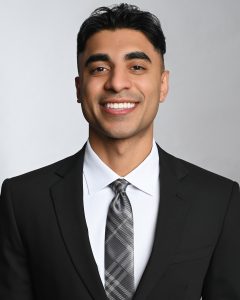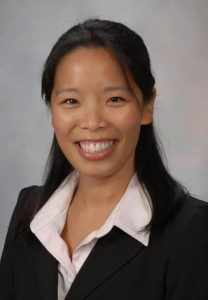Growing up in small-town Pittsburg, Kansas, Jessica Clements wanted to be helpful.
In elementary and middle school, she was a Girl Scout and part of a mentorship group. As a high school student, she was active in many clubs, including student government where she was elected class president.
Her desire to help makes Jessica, who holds a master’s degree in nuclear engineering sciences, a natural ABR volunteer.
“My interest in leadership and volunteering started in elementary school, being involved in activities,” Jessica said. “It’s just in my DNA.”

Jessica is a medical physicist and radiation safety officer at the University of Vermont Medical Center. She earned a bachelor’s in physics from Pittsburg State University in 2002 and a master’s from the University of Florida in 2005. Jessica was certified by the ABR in diagnostic medical physics in 2008 and nuclear medical physics in 2011.
She has been an ABR volunteer for 14 years, starting off by writing questions for the computer-based Medical Physics Part 2 Exam.
“An opportunity came up and it seemed like a great way to give back to the profession and help keep exam content relevant and appropriate for candidates,” Jessica said.
In 2014, she was invited by former ABR Board of Governors member Anthony Seibert, PhD, to join the Diagnostic Medical Physics Oral Exam Committee. She finished her run on that committee as chair in 2023. She remains part of the Nuclear Medical Physics Oral Exam Committee.
She has been an oral examiner for the former in-person and current remote administrations. The goal remains the same: Engage with candidates to determine their knowledge on the appropriate subject matter.
“I think remote exams are amazing for candidates,” Jessica said. “What a game changer. But I still think of (oral exams) as a conversation.”
Jessica has been part of four ABR committees along with numerous others in medical physics associations and societies. She’s a fellow of the American College of Radiology and American Association of Physicists in Medicine.
She said she once took a personality quiz that matched her with Amy Poehler’s character, Leslie Knope, from the former NBC show “Parks and Recreation.” Knope was the deputy director of the parks and recreation department and eventually a council member for the fictional city of Pawnee, Indiana. Knope enjoyed serving on committees with the goal of improving people’s lives.
“I can identify with her character,” she said. “I know it sounds super nerdy, but I think that’s important work. It has a high impact.”
Like Knope, Jessica enjoys living and working in a small community. She and her husband have known each other since preschool in rural Kansas and have found Burlington, Vermont, to be a good substitute for home. They moved there from Southern California in July 2022.
“The University of Vermont is unique because it’s like living in a community where I grew up, but there’s a level one trauma center, academic medical center, and it’s the main hospital for the state,” she said. “It’s like having your cake and eating it, too, by living in a small town with a big hospital.”
Another reason she came to the University of Vermont Medical Center was to start a medical physics residency program. Again, she wants to help.
“It’s preservation of the profession, making sure we have enough people,” Jessica said. “There’s a shortage in every single role in pretty much every industry and keeping it alive is really important.”
Patrick Byrne, PhD, served as chair of the Nuclear Medical Physics Oral Exam Committee with Jessica. He said her contributions and eagerness to help were obvious.
“Jessica is an all-around great addition to any committee,” Dr. Byrne said. “Working with her was simply effortless, as she not only quickly and thoroughly understood the work that needed to be done, but also that she’s the literal definition of a team player.”
After more than a decade of working with the ABR, Jessica remains enthusiastic about her duties. She encourages all diplomates to consider volunteering to assist their professions and improve patient safety.
“Anybody who’s on the fence should check it out and see what they have to contribute and gain from the experience,” she said. “I give it a five-star recommendation.”
When he started at Rush Medical College in Chicago, Armaan Mazra, MS, had a goal: In 2025, he would be matching into a surgical residency, possibly orthopaedic surgery.
“I joined almost every surgical Interest group I could because I didn’t have a lot of perspective on medicine, family members in medicine, or general exposure,” he said. “I went pretty gung-ho about it.”
Once he started scrubbing in to assist orthopaedic surgery procedures in his second year, his interests started to shift. He wasn’t enjoying the process.
“I was pretty open to change into a specialty that better aligned with my interests and values,” he said.

By his third year, he had found his new direction: vascular and interventional radiology. It was a field that he knew little about until his mother needed a VIR procedure.
The experience sent him down a different career path.
“I saw from the patient’s perspective how VIR can offer procedures to people who may not be candidates for surgery,” Armaan said. “I was moved by the hope that it offered.”
Armaan started changing course in his medical studies, leaving orthopaedic surgery behind. He soon realized that he was making the right move.
“I decided to take a VIR elective and gained exposure to the types of procedures that were available,” he said. “I found it pretty amazing, and I was inspired by all of the work that was being done and innovative procedures that were being developed every year.”
He developed an interest in medicine as an undergraduate. When Armaan was an undergraduate student at UC Santa Cruz, his father suffered medical issues prohibiting him from driving for a while. Armaan started taking his dad to appointments at Providence Cedars-Sinai Tarzana Medical Center, where he met internal medicine specialist and nephrologist, Kamyar Kamjoo, MD, who offered a chance for the college student to shadow him and serve as a scribe.
It was a big change for Armaan, who had many interests, including cooking, as a high school and college student.
“He was really inspiring,” Armaan said. “His passion for patient care helped persuade me to go into medicine.”
With his interest in medicine coming relatively late in his undergrad days, Armaan believed that he needed more experience to become better prepared to pursue a medical degree. After graduating from UC Santa Cruz, he attended the Boston University School of Medicine, where he earned a master’s in medical sciences in 2021.
He took physiology, histology, and pathology courses and performed research at Boston Children’s Hospital and Harvard Medical School, all important steps toward becoming a qualified medical student.
“I wanted to finish my prerequisites and make myself a strong candidate to go to a medical school that aligned with his passion for service” Armaan said. “The East Coast provided me with that opportunity, and it gave me the chance to do clinical and translational research, which I hadn’t done as an undergraduate.”
Rush was his medical school choice because he wanted to pick a place that emphasized community service at its core. During his time there, he created an organization, RUSwabbed, an extension of the Gift of Life Marrow Registry.
“(RUSwabbed) helps patients with diverse ethnic backgrounds obtain bone marrow transplants because there’s a significant disparity in access,” he said. “I realized that this was a big disparity as I was creating this organization. I wanted to diminish the disparity because it’s affected my cultural background and something that I saw was an issue.”
Armaan’s past few months have been a whirlwind of applications and interviews, all in hope of landing a residency spot. He did three away rotations in the late fall to gain exposure to VIR and learn how it’s practiced at different institutions. Those visits concluded just as he was starting his interview cycle.
“The process can be stressful, but it’s also rewarding in a lot of ways,” Armaan said. “I’ve applied to programs that I thought were a good fit for me and were going to provide the type of training that I was interested in.”
Armaan has applied to programs across the country. His time in California, Boston, and Chicago broadened his horizons for an acceptable training location.
With the process winding down, he could see himself happy training at any of several programs.
“I’ve noticed that my rank list changes after each interview to some degree based off components that I found rewarding about the program,” he said. “Throughout this interview trail, I’ve tried to keep an open mind.”
Wherever he lands for residency, Armaan is motivated for what’s ahead.
“It’s exciting,” he said. “I’m preparing for a whole new journey in my life.”
With two older sisters planning to go into medicine, young Katherine Tzou was looking for a separate career.
“Because I’m the youngest and wanted to be different, I thought there was no way I was going into medicine,” she said. “I was going to be an oceanographer.”
Instead, the seas parted, and life changed for the future Dr. Tzou. As a teenager, she volunteered at a nursing home and at the VA Medical Center in Dayton, Ohio, where her dad was the chief biochemist.
Her eyes were opened.

“I enjoy working with patients and working in teams,” said Dr. Tzou, who earned her medical degree from The Ohio State University College of Medicine. “That’s what led me to say, ‘Maybe it’s in my genes. Maybe I’m destined to pursue medicine.’”
Her sisters are cardiologists and Dr. Tzou is a radiation oncologist, specializing in GU and GYN malignancies. She’s an associate professor at University of Colorado Medicine and sees patients at Memorial Hospitals North and Central in Colorado Springs.
She’s been an ABR volunteer since 2017, writing questions for the Radiation Oncology Qualifying Exam and serving as an oral examiner. Just five years out of training, Dr. Tzou took a cautious approach to her first assignment.
“I still remember that first set of questions,” she said. “I think they asked for six questions that year, and I think I wrote something like 12 because I wanted to have backups. I was anxious about it, but then once I got into it, everyone was so kind, and it was helpful to hear what other people were asking.”
She obviously caught on. David Gaffney, PhD, MD, the chair of Dr. Tzou’s Radiation Oncology Qualifying GYN Committee, calls her a “committed, capable, creative, intelligent, and brilliant question writer.”
Dr. Tzou’s initial experience as an ABR examiner came in spring 2021, the first remote oral exams during the pandemic. She said the experience has been invaluable.
“It has helped me grow as a physician in my own practice,” she said. “Because I do it twice a year, I’m constantly looking for new data and talking with experts in the field. It’s been such a wonderful experience. One of my favorite things that I do is volunteer for the ABR.”
Volunteering for the ABR gives Dr. Tzou a chance to give back to her profession and learn from colleagues. She has found that discussions go beyond the subjects at hand
“GYN is such a small group, so you don’t commonly find someone who wants to talk about it,” she said. “The beauty of the ABR is that you’re finding your people, talking about cases, learning from each other and how to improve care for your patients, discussing your life, and developing friendships beyond just work. It’s really wonderful.”
As a physician who’s involved in both GU and GYN, Dr. Tzou has her feet in two subspecialties. Her attraction to GYN started from a solid foundation of knowledge during residency at Mayo Clinic Florida was solidified during an away rotation at Washington University in St. Louis, when she did approximately 50 cases in a month.
“I learned I really enjoy doing procedures,” she said. “I am honored that patients allow me to care for them during a very vulnerable time and in a very sensitive area. Because of the procedures I do, I get to know my patients and their families and friends on a deeper level.”
She stayed on at Mayo after completing her residency in 2012, eventually becoming an associate professor of radiation oncology. It was there that she became interested in GU; one of her mentors had a high volume of cases and asked her to assist.
“I got into it and enjoyed it,” Dr. Tzou said. “It was somewhat parallel to what I was doing with my GYN patients.”
Going into medicine wasn’t such a bad idea after all. Dr. Tzou’s calling was different from those of her sisters, but the goal remains the same.
“I am fortunate that my family taught me to work hard, always strive to improve, and treat everyone as equals,” she said “My mentors and residency taught me we are put on this earth to take care of each other. Whether that’s your colleague or a patient or a family member, that’s the most important thing. That’s what makes me stay late or come in early. If we always try to do the right thing for our patients and for each other, we can make the world a more compassionate place. What’s more gratifying than that?”


